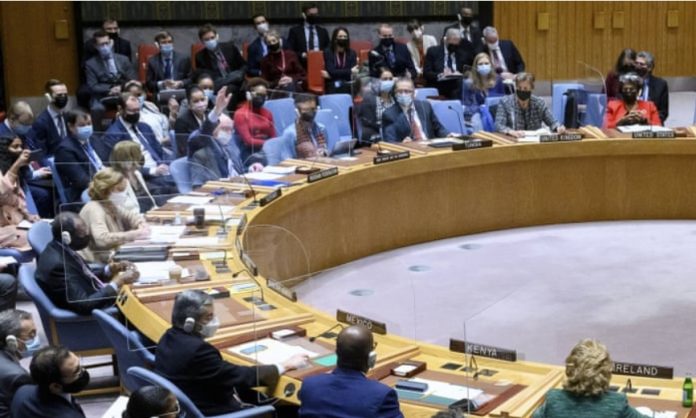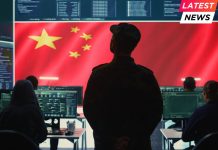By Charles H. Camp, Kiran Nasir Gore and Lilia Chu
The UN Charter, signed in 1945, reflects the international community’s collective transnationalist view that unilateral tactics, coercion, and sheer force would no longer be tolerated to compel submission to individual ambitions and desires. In the years since, the principles of the UN Charter to promote peace and respect for human rights have increasingly been understood as a responsibility on the part of the global community to protect against the horrors of genocide and other human rights abuses—a duty known as the “Responsibility to Protect” or “R2P.” Today, the Responsibility to Protect doctrine presents a call to action. It is imperative for States to intervene to protect Ukraine and its civilians from the Russian Federation’s unprovoked invasion and use of weapons in civilian populated areas.
Introduction
After the World Wars, the establishment of the United Nations sought to put an end to all war by implementing broad prohibitions on the use and even the threat of use of force, allowing only an exception for self-defense.[1] The UN Charter clearly states “[a]ll Members shall settle their international disputes by peaceful means in such a manner that international peace and security, and justice, are not endangered”[2] and “[a]ll Members shall refrain in their international relations from the threat or use of force against the territorial integrity or political independence of any state, or in any other manner inconsistent with the Purposes of the United Nations.”[3] In sum, the UN Charter reflects the worldview collectively adopted by States at the time: they had agreed that unilateral tactics, coercion, and sheer force would no longer be tolerated to compel submission to individual ambitions and desires.[4]
In the intervening decades, the principles of the UN Charter to promote peace and respect for human rights increasingly have been understood as a responsibility on the part of the global community to protect against the horrors of genocide and other human rights abuses—a duty known as the “Responsibility to Protect” or “R2P.”
These responsibilities cannot be reconciled with current events. Last week, the Russian Federation, a member of the UN, blatantly breached the UN Charter. Russia invaded Ukraine without provocation and is indiscriminately using weapons in civilian populated areas and acting in direct defiance of the UN Charter[5] and international humanitarian laws.[6]
On February 24, 2022, the UN Refugee Agency released a statement advising that “[w]e are gravely concerned about the fast-deteriorating situation and ongoing military action in Ukraine. The humanitarian consequences on civilian populations will be devastating.”[7] The UN’s Secretary General António Guterres stated: “The price in human suffering, destruction and damage to European and global security is too high to contemplate. We simply cannot accept even the possibility of such a disastrous confrontation.”[8]
The UN Human Rights Council already has been called to “urgently convene to discuss the crisis and establish a mechanism to monitor and report on human rights abuses, especially those that may amount to war crimes or crimes against humanity.[9] United States Secretary of State Anthony J. Blinken has described the crisis as “the greatest threat to security in Europe since World War II.”[10]
The magnitude of this crisis is evidenced by the numbers. As of this writing, it is estimated that there have been more than 50,000 casualties in Ukraine and 1.5 million internally displaced persons[11] and, within just these first few days after the invasion began, the UN has estimated that over 368,000 refugees have fled from Ukraine.[12] Meanwhile, the world is watching these events unfold in real time through various instantaneous streams of information, including unfiltered and raw pleas for support over social media. There is undoubtedly urgent need for States to address and prevent Russian’s invasion of Ukraine’s sovereignty and the atrocities being committed against civilians.
Russia’s Ability to Undermine the UN’s Intent and Purpose
A fundamental purpose of the UN is “[t]o achieve international co-operation in solving international problems of an economic, social, cultural, or humanitarian character.”[13] Consistent with this purpose, the UN Security Council was created to authorize the use of force in response to “any threat to the peace, breach of the peace or act of aggression”[14]—including the ongoing unlawful invasion of Ukraine by Russia, making the Security Council unable, indeed impudent to deal with Russia’s ongoing invasion of Ukraine.
The veto power given to the five permanent members of the Security Council, which includes Russia, makes it nearly impossible for the Security Council to authorize use of force in this particular situation. So long all UN Member States permit Russia to remain on the Security Council—much less allow Ambassador Vasily Nebenzya to remain as its President—Russia’s veto power on the Council means that it will never be capable of appropriately responding to Russia’s own “threat to the peace, breach of the peace or act of aggression” in Ukraine.[15]
Russia’s ability to impede the Security Council from taking action has already been seen. On February 25, 2022, Russia vetoed a draft Security Council Resolution, which “would have deplored Moscow’s invasion of Ukraine” and “demanded that Russia immediately cease its use of force against Ukraine” and “immediately, completely, and unconditionally withdraw all of its military forces from the territory of Ukraine within its internationally recognized borders.”[16]
Importantly, on February 28, 2022, the UN General Assembly held an Emergency Special Session on Russia’s attack on Ukraine—only the 11th emergency special session in the UN’s history—to condemn Russia’s unlawful invasion of Ukraine.[17]
The present inability of the Security Council to authorize action undermines the intent and purpose of the UN as a whole. Some argue that the UN’s failure to respond to the horrors of mass atrocities fundamentally changes the binding nature of the UN Charter because the present circumstances are resulting in repeated violations of Article 2(4), which broadly prohibits the use and even the threat of use of force, save for the self-defense exception which does not apply here.[18]
The Role of the Responsibility to Protect Doctrine
The international community has undoubtedly articulated an interest in working collectively to prevent mass atrocities and humanitarian disasters, resulting in the Responsibility to Protect doctrine. The Responsibility to Protect doctrine requires States to prevent, react to, and rebuild following human rights crises. This principle is acknowledged by the UN. Indeed, the responsibility is grounded in “well-established legal obligations that entail an obligation not only to punish atrocity crimes but also to prevent them.”[19] In fact, it is a collective duty upon society. The UN notes that “it is important that States partner with other actors, such as international and regional organisations, as well as civil society actors, to receive support and amplify their efforts in this regard.”[20]
Specifically, the UN recognizes three pillars to the Responsibility to Protect doctrine:
- “Every state has the Responsibility to Protect its populations from four mass atrocity crimes: genocide, war crimes, crimes against humanity and ethnic cleansing,”
- “The wider international community has the responsibility to encourage and assist individual States in meeting that responsibility,” and
- “If a state is manifestly failing to protect its populations, the international community must be prepared to take appropriate collective action, in a timely and decisive manner and in accordance with the U.N. Charter.”[21]
This includes the current situation involving Ukraine, which has pleaded for other States to help defend against an overwhelmingly larger Russian military. The imperative is also clear: Ukraine simply is unable to defend itself alone should Russia decide to double-down on its efforts crush Ukraine and its leadership.
While the Responsibility to Protect doctrine may not be specifically delineated as such in any treaty, international scholars, nations, and the UN itself agree that it is part of customary international law, which is binding on all States, regardless of whether it has been codified as such, or whether the State consents. The Responsibility to Protect doctrine “has been invoked in more than 80 U.N. Security Council resolutions…[,] in more than 50 Human Rights Council resolutions and 13 General Assembly resolutions.”[22] The Responsibility to Protect doctrine can also be seen in the Fourth Geneva Convention for the Protection of Civilian Persons in Time of War,[23] specifically the Convention provides that “[c]ivilians are to be protected from murder, torture or brutality…”[24]
Additionally, the doctrine has been affirmed multiple times in history. In 2000, the “geographically diverse” International Commission on Intervention and State Sovereignty, convened by Canada, articulated a global responsibility to prevent, react to, and rebuild following human rights crises.[25]
In 2004, the Report of the Secretary-General’s High-level Panel on Threats, Challenges and Change identified both a “State and international responsibility to protect civilians from the effects of war and human rights abuses.”[26] While the 2004 Report noted that the Responsibility to Protect doctrine “has yet to truly overcome the tension between the competing claims of sovereign inviolability and the right to intervene” and suffered additionally from an “operational challenge,” as “[c]ollective security institutions have proved particularly poor at meeting the challenge posed by large-scale, gross human rights abuses and genocide,” ultimately the UN has invoked the doctrine when authorizing intervention.[27] And, ironically, the Responsibility to Protect doctrine was Russia’s erroneous justification for both its illegal annexation of Crimea in 2014[28] and likely is part of its justification of the current unprovoked, illegal invasion of Ukraine.
In 2011, the UN Security Council partly justified authorization of limited military intervention in Libya based upon the Responsibility to Protect doctrine.[29] Furthermore, since 2009, the UN Secretary-General has released a report on the Responsibility to Protect every year, demonstrating the gradual acceptance of the doctrine.[30]
Additionally, supporters of the Responsibility to Protect doctrine rely on the belief that the underlying principles and goals of the UN Charter can only be realized when its text is read in the context of changing geopolitical and economic realities. Although Article 2(4) of the UN Charter does not include an exception for unilateral intervention involving the use of force based upon humanitarian interests,[31] it is understood that the Charter aims to promote peace and respect for human rights. Thus, the law must evolve where a normative change has taken place in international law, namely the recognition of a responsibility to protect and the legitimacy of unilateral use of force in limited circumstances.[32]
An Important Call to Action
Although there are fears that intervention on the basis of humanitarian reasons could be used as a pretext for aggression premised upon distinctly non-humanitarian interests—as Russia did in Crimea and currently is doing to seek unlawful regime change in Ukraine— in 1625 Dutch jurist Hugo Grotius notably concluded that “a right does not at once cease to exist in case it is to some extent abused…”[33] Professor Ian Hurd, an expert on international law and politics at Northwestern University, has recently considered the question and concluded that “[t]he debate suggests that humanitarian intervention is either legal or illegal depending on one’s understanding of how international law is constructed, changed, and represented. No amount of debate over the law or recent cases will resolve its status.”[34]
Russia’s invasion of Ukraine has already had an extreme impact on bordering countries. Hundreds of thousands of refugees have been flooding Romania, Poland, and other countries in search of safety.[35] The UN estimates that as a result of Russia’s bombardment of Ukraine, there have been at least 240 civilian casualties—a number that grows every hour that other countries do not fulfill the duties arising from their Responsibility to Protect.[36] And this is only the start of the Ukrainian refugee crisis. The UN notes that “the actual figures were likely to be ‘considerably higher.’”[37] The impact on civilians is clear. Not only have many homes been damaged and/or destroyed, and numerous civilians including children killed by the Russian military, but civilian infrastructure has also been irreparably harmed.[38] Many Ukrainians are now without electricity, water, or access to markets.[39]
While Ukraine is not a part of NATO, and thus not entitled to the security protections offered by the thirty member nations, NATO Member States have considered the risk to sovereignty that Russia’s invasion of Ukraine poses. NATO allies are prepared to defend NATO territory if Russia were to attempt to expand its incursion on the territory of NATO Member States. But such hesitancy on the party of NATO Member States to intervene militarily is inconsistent with their Responsibility to Protect the people of Ukraine.
This, of course, raises the question of how long States can wait to intervene militarily in Ukraine given Russia’s clear desire to topple Ukraine’s current, democratically-elected government. Indeed, during Russia’s ongoing illegal invasion of Ukraine, Russia has threatened “military and political consequences” against both Finland and Sweden if they attempt to join NATO.[40] The Council on Foreign Relations anticipates that “[t]ensions are likely to increase between Russia and neighbouring NATO member countries” likely triggering NATO obligations.[41] How long can States wait to stop Russia from destroying Ukraine, and threatening other countries in order to end Russia’s growing ambitions to prevent any additional countries from joining NATO?
As an example, military intervention was authorized in Libya in order to minimize the possible domestic impact of a refugee crisis as well as “to prevent destabilizing the region…”[42] It is reasonable for individual States to be motivated, at least in part, by a desire to mitigate or avoid the invasion of cross-border chaos—something all of Europe, most especially its direct neighbours—must consider.
Perhaps if the imperative must be underscored, it is worth revisiting the origins of the UN and its Charter. World War II was devastating and the powers remaining after its atrocities recognized the dire importance of peace and amicable and conciliatory frameworks to prevent mass atrocities from being committed again.[43] The UN is foundational to additional and further institutions that have emerged in the intervening decades to help build the transnationalist legal order, including for example the World Bank and the World Trade Organization. It is precisely these international institutions that allow the international community to grow and prosper. In this globalized world, there simply is no room for unilateral tactics and go-it-alone attitudes.
Meanwhile, in stark contrast, the Russian invasion of Ukraine has been referred to as the greatest threat to the European Union since World War II.[44] UN Secretary General Guterres has acknowledged that “[t]he protection of civilians must be priority number one. International humanitarian and human rights laws must be upheld. The decisions of the coming days will shape our World and directly affect the lives of millions upon millions of people.”[45]
Indeed, the United States and the United Kingdom arguably have a special obligation to protect Ukraine from the Russian invasion. In 1994, the United States, Russia, and the United Kingdom signed the Budapest Memorandum, committing “to respect the independence and sovereignty and the existing borders of Ukraine” and “to refrain from the threat or use of force” against Ukraine.[46] While the Memorandum was not a collective defense treaty and does not require the United States or the United Kingdom to commit military forces, it does require that they do “their utmost to stop it.”[47]
Today, the Responsibility to Protect doctrine presents a call to action. States must intervene in accordance with the UN Charter and the indisputable Responsibility to Protect doctrine[48] to protect Ukraine and its civilians from Russia’s unprovoked invasion and use of weapons in civilian populated areas. States must ensure that the people of Ukraine, including its heroic leadership, do not all become victims of Russian war crimes, crimes against humanity, and aggression—charges which are already being investigated by the International Criminal Court.[49]
The article was first published in The World Financial Review.
About the Authors
Charles H. Camp is an international lawyer with over thirty years of experience representing foreign and domestic clients in international litigation, arbitration, negotiation, and international debt recovery. In 2001, Mr. Camp opened the Law Offices of Charles H. Camp, P.C. in Washington, D.C. to focus on effective, personalized representation in complex, international matters. Mr. Camp teaches international negotiations at the George Washington University Law School.
Kiran Nasir Gore is Counsel at the Law Offices of Charles H. Camp, P.C. She advocates before U.S. courts, commercial and investment arbitration tribunals, and investigative authorities. She has special expertise in matters of public international law and international dispute resolution. Kiran also draws on her professional experiences as an educator at the George Washington University Law School and New York University’s Global Study Center in Washington, D.C.
Lilia Chu is a Law Clerk at the Law Offices of Charles H. Camp, P.C. She graduated from New York University in 2017 and is currently pursuing a Juris Doctorate at George Washington University Law School. She is a member of The George Washington International Law Review and former Deputy Moderator in Chief of GW’s International Law and Policy Brief.
References
- [1] UN Charter, at Arts 2(4), 51.
- [2] Id. at Art. 2(3).
- [3] Id. at Art. 2(4).
- [4] See generally Myres S. McDougal & Florentino P. Feliciano, International Coercion and World Public Order: The General Principles of the Law of War, 67 YALE L.J. 771 (1958). See also Thomas G. Weiss, The United Nations: Before, During and After 1945, 91 INT’L AFF. 1221, 1226–29 (2015).
- [5] Statement on Ukraine, United Nations (Feb. 24, 2022), https://www.un.org/press/en/2022/sgsm21158.doc.htm.
- [6] Statement on the Situation in Ukraine, Global Centre For The Responsibility To Protect (Feb. 24, 2022), https://www.globalr2p.org/publications/statement-on-the-situation-in-ukraine/.
- [7] Statement on the Situation in Ukraine Attributed to U.N. High Commissioner for Refugees Filippo Grandi, UNHCR The U.N. Refugee Agency (Feb. 24, 2022), https://www.unhcr.org/en-us/news/press/2022/2/621770524/statement-situation-ukraine-attributed-un-high-commissioner-refugees-filippo.html.
- [8] Secretary-General’s Remarks to the Press Stakeout – on Ukraine, United Nations Ukraine (Feb. 14, 2022), https://ukraine.un.org/en/172123-secretary-generals-remarks-press-stakeout-ukraine.
- [9] Id.
- [10] Remarks, Anthony J. Blinken, Sec. of State & Dmytro Kuleba, Ukrainian Foreign Minister (Feb. 22, 2022), https://www.state.gov/secretary-antony-j-blinken-and-ukrainian-foreign-minister-dmytro-kuleba-at-a-joint-press-availability-2/ [hereinafter Blinken and Kuleba Remarks].
- [11] Global Conflict Tracker: Conflict in Ukraine, Council on Foreign Relations, https://www.cfr.org/global-conflict-tracker/conflict/conflict-ukraine (last accessed Feb. 27, 2022).
- [12] Michael Shields, Ukrainian Refugee Outflow Hits 368,000, still rising – U.N., NPR (Feb. 27, 2022), https://www.reuters.com/world/europe/ukrainian-refugee-outflow-hits-368000-still-rising-un-2022-02-27/.
- [13] UN Charter, Art. 1, at ¶ 3.
- [14] Id. at Art. 39.
- [15] Id. at Art. 39. “[A]ction cannot be taken on an issue that is brought before the Security Council if any one of the permanent members vote ‘no’ on a draft resolution.” Security Council, Model United Nations, United Nations, https://www.un.org/en/model-united-nations/security-council.
- [16] Michelle Nichols and Humeyra Pamuk, Russia Vetoes U.N. Security Action on Ukraine as China Abstains, Reuters (Feb. 22, 2022), https://www.reuters.com/world/russia-vetoes-un-security-action-ukraine-china-abstains-2022-02-25/.
- [17] Security Council vote sets up emergency UN General Assembly session on Ukraine crisis, United Nations (Feb. 27. 2022), https://news.un.org/en/story/2022/02/1112842.
- [18] Ian Hurd, Is Humanitarian Intervention Legal?, 25 Ethics & International Affairs 3, 293, 303 (2011) (citing Michael Gelnnon, The Fog of Law: Self-Defense, Inherence, and Incoherence in Art. 51 of the United Nations Charter, 25 Harv. J.L. & Pub. pol’y, 539-58 (2002)).
- [19] Responsibility to Protect, United Nations, Office on Genocide Prevention And The Responsibility to Protect, https://www.un.org/en/genocideprevention/member-states.shtml.
- [20] Id.
- [21] What is R2P?, Global Centre For the Responsibility To Protect, https://www.globalr2p.org/what-is-r2p/.
- [22] What is R2P?, supra note 21.
- [23] Convention (IV) relative to the Protection of Civilian Persons in Time of War. Geneva, 12 August 1949.
- [24] Id. at Arts 13, 32.
- [25] Implementing the Responsibility to Protect, Report of the Secretary-General, U.N. Doc. A/63/677 (2009) at ¶ 9.
- [26] A More Secure World: Our Shared Responsibility, Report of the Secretary-General’s High-level Panel on Threats, Challenges, and Change, U.N. Doc. A/59/565 (2004) at ¶ 36.
- [27] Id.
- [28] Steven Pifer, Crimea: Six years after illegal annexation, Brookings (Mar. 17, 2020), https://www.brookings.edu/blog/order-from-chaos/2020/03/17/crimea-six-years-after-illegal-annexation/.
- [29] Security Council Res. 1973 (March 17, 2011). This allowed “a NATO-led alliance” to conduct “air strikes against military targets that posed a severe threat to civilians. Libya, Global Centre For Responsibility to Protect (Oct. 20, 2021), https://www.globalr2p.org/countries/libya/.
- [30] Catherine Renshaw, R2P: An Idea Whose Time Never Comes, Lowy Institute (Jun. 2, 2011), https://www.lowyinstitute.org/the-interpreter/r2p-idea-whose-time-never-comes.
- [31] UN Charter at 2(4).
- [32] Id.
- [33] Goodman at 107 quoting Hugo Grotius, De Jure Belli Ac Pacis Libri Tres, ch. XXV, pt. VIII (4) (Carnegie ed., Francis W. Kelsey trans. 1925) (1625).
- [34] Hurd, supra note 18 at 293.
- [35] Andrew Higgins, At the Polish Border, Tens of Thousands of Ukrainian Refugees, NYTimes (Feb. 25, 2022), https://www.nytimes.com/2022/02/25/world/europe/ukrainian-refugees-poland.html.
- [36] U.N. Reports At Least 240 Civilian Casualties, 64 Deaths in Ukraine, Reuters (Feb. 27, 2022, 2:42 AM EST), https://www.reuters.com/world/europe/un-reports-least-240-civilian-casualties-64-deaths-ukraine-2022-02-27/.
- [37] Id.
- [38] Id.
- [39] Id.
- [40] Lexi Lonas, Russia Threatens “Military and Political Consequences” If Finland, Sweden try joining NATO, The HILL (Feb. 25, 2022, 12:53 PM EST), https://thehill.com/policy/international/russia/595853-russia-threatens-military-and-political-consequences-if-finland?rl=1.
- [41] Global Conflict Tracker: Conflict in Ukraine, Council on Foreign Relations, https://www.cfr.org/global-conflict-tracker/conflict/conflict-ukraine.
- [42] Catherine Powell, Libya: A MultiLateral Constitutional Moment?, 106 A.J.I.L. 298, 314 (2012).
- [43] United Nations, History.com (Aug. 21, 2018), https://www.history.com/topics/world-war-ii/united-nations.
- [44] Blinken and Kuleba Remarks, supra note 12.
- [45] Statement on Ukraine, supra note 5.
- [46] Budapest Memorandum on Security Assurances (1994).
- [47] Blinken and Kuleba Remarks, supra note 12.
- [48] Ivana Stradner, A Responsibility to Protect Ukraine, AEI (Feb. 22, 2022), https://www.aei.org/foreign-and-defense-policy/a-responsibility-to-protect-ukraine/ (“The world has a responsibility to protect a sovereign state from unprovoked aggression, and Ukraine has a responsibility to protect its people.”).
- [49] Statement of ICC Prosecutor, Karim A.A. Khan QC, on the Situation in Ukraine: “I have decided to proceed with opening an investigation,” ICC (Feb. 28, 2022), https://www.icc-cpi.int/Pages/item.aspx?name=20220228-prosecutor-statement-ukraine.








































